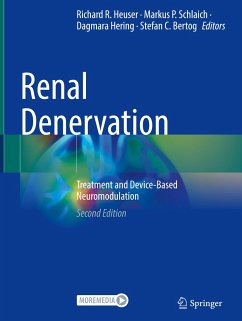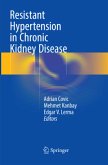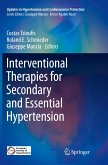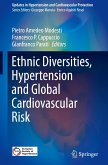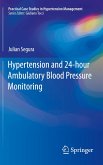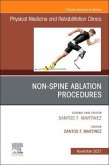Renal Denervation
Treatment and Device-Based Neuromodulation
Herausgegeben:Heuser, Richard R.; Schlaich, Markus P.; Hering, Dagmara; Bertog, Stefan C.
Renal Denervation
Treatment and Device-Based Neuromodulation
Herausgegeben:Heuser, Richard R.; Schlaich, Markus P.; Hering, Dagmara; Bertog, Stefan C.
- Gebundenes Buch
- Merkliste
- Auf die Merkliste
- Bewerten Bewerten
- Teilen
- Produkt teilen
- Produkterinnerung
- Produkterinnerung
This extensively revised edition examines renal pathophysiology and the rationale for renal denervation for the management of hypertension, as well as possible long-term benefits and risks of this therapy. Renal denervation is a minimally invasive, endovascular catheter-based procedure that makes use of radiofrequency ablation to treat resistant hypertension, with studies showing a high degree of effectiveness. The devices involved in the continued evolution of this therapy are discussed and the book incorporates analyses of the development of the technique while evaluating its cost…mehr
Andere Kunden interessierten sich auch für
![Renal Denervation Renal Denervation]() Renal Denervation75,99 €
Renal Denervation75,99 €![Resistant Hypertension in Chronic Kidney Disease Resistant Hypertension in Chronic Kidney Disease]() Resistant Hypertension in Chronic Kidney Disease67,99 €
Resistant Hypertension in Chronic Kidney Disease67,99 €![Interventional Therapies for Secondary and Essential Hypertension Interventional Therapies for Secondary and Essential Hypertension]() Interventional Therapies for Secondary and Essential Hypertension90,99 €
Interventional Therapies for Secondary and Essential Hypertension90,99 €![Ethnic Diversities, Hypertension and Global Cardiovascular Risk Ethnic Diversities, Hypertension and Global Cardiovascular Risk]() Ethnic Diversities, Hypertension and Global Cardiovascular Risk97,99 €
Ethnic Diversities, Hypertension and Global Cardiovascular Risk97,99 €![Hypertension and 24-hour Ambulatory Blood Pressure Monitoring Hypertension and 24-hour Ambulatory Blood Pressure Monitoring]() Julian SeguraHypertension and 24-hour Ambulatory Blood Pressure Monitoring41,99 €
Julian SeguraHypertension and 24-hour Ambulatory Blood Pressure Monitoring41,99 €![Non-surgical Ablation Therapy for Early-stage Breast Cancer Non-surgical Ablation Therapy for Early-stage Breast Cancer]() Non-surgical Ablation Therapy for Early-stage Breast Cancer104,99 €
Non-surgical Ablation Therapy for Early-stage Breast Cancer104,99 €![Non-Spine Ablation Procedures, An Issue of Physical Medicine and Rehabilitation Clinics of North America Non-Spine Ablation Procedures, An Issue of Physical Medicine and Rehabilitation Clinics of North America]() Non-Spine Ablation Procedures, An Issue of Physical Medicine and Rehabilitation Clinics of North America99,99 €
Non-Spine Ablation Procedures, An Issue of Physical Medicine and Rehabilitation Clinics of North America99,99 €-
-
-
This extensively revised edition examines renal pathophysiology and the rationale for renal denervation for the management of hypertension, as well as possible long-term benefits and risks of this therapy. Renal denervation is a minimally invasive, endovascular catheter-based procedure that makes use of radiofrequency ablation to treat resistant hypertension, with studies showing a high degree of effectiveness. The devices involved in the continued evolution of this therapy are discussed and the book incorporates analyses of the development of the technique while evaluating its cost effectiveness and future applications.
Renal Denervation: Treatment and Device-Based Neuromodulation describes the technique in detail, its advances and its pitfalls. While it has been estimated that 50% of Western civilization has hypertension and approximately 20% of patients have resistant hypertension, hypertension remains the leading cause of cardiovascular morbidity and mortality thusstrengthening arguments to consider a wider range of potential solutions to manage these patients.
Renal Denervation: Treatment and Device-Based Neuromodulation describes the technique in detail, its advances and its pitfalls. While it has been estimated that 50% of Western civilization has hypertension and approximately 20% of patients have resistant hypertension, hypertension remains the leading cause of cardiovascular morbidity and mortality thusstrengthening arguments to consider a wider range of potential solutions to manage these patients.
Produktdetails
- Produktdetails
- Verlag: Springer / Springer International Publishing / Springer, Berlin
- Artikelnr. des Verlages: 978-3-031-38933-7
- 2. Aufl.
- Seitenzahl: 268
- Erscheinungstermin: 24. Januar 2024
- Englisch
- Abmessung: 285mm x 215mm x 20mm
- Gewicht: 993g
- ISBN-13: 9783031389337
- ISBN-10: 3031389336
- Artikelnr.: 68282007
- Herstellerkennzeichnung Die Herstellerinformationen sind derzeit nicht verfügbar.
- Verlag: Springer / Springer International Publishing / Springer, Berlin
- Artikelnr. des Verlages: 978-3-031-38933-7
- 2. Aufl.
- Seitenzahl: 268
- Erscheinungstermin: 24. Januar 2024
- Englisch
- Abmessung: 285mm x 215mm x 20mm
- Gewicht: 993g
- ISBN-13: 9783031389337
- ISBN-10: 3031389336
- Artikelnr.: 68282007
- Herstellerkennzeichnung Die Herstellerinformationen sind derzeit nicht verfügbar.
Richard R. Heuser received his medical degree from the University of Wisconsin, School of Medicine in Madison, Wis., and completed his medicine internship and residency, as well as his cardiology fellowship, at The Johns Hopkins Hospital in Baltimore, Md. He currently serves as chief of cardiology at St. Luke's Medical Center, and as the professor of medicine at the University of Arizona College of Medicine. Markus P. Schlaich is a cardiologist at the Baker Heart and Diabetes Institute in the Hypertension and Kidney Disease Research Group. Dagmara Hering is a visiting professor at the Medical University of Gdansk, Poland, and a Professorial Fellow at Baker IDI Heart and Diabetes Institute, Melbourne, Australia. She is a medical scientist and clinical specialist in internal medicine and hypertension. Her clinical research has been focused on the role of the sympathetic nervous system and its reflex mechanisms, arterial stiffness, and hemodynamics in the development of hypertension and its progression including cardiovascular and renal complications. She has substantially contributed to the understanding of the efficacy of novel device-based therapies for the management of hypertension, heart failure, and chronic kidney disease. She has received a total of 17 awards including those obtained from the Polish Society of Hypertension, European Society of Hypertension, International Society of Hypertension, High Blood Pressure Research Council of Australia, Polish Academy of Sciences, and Polish Academy of Arts and Sciences. She is a nucleus officer of the European Society of Hypertension Working Group on Hypertension and the Brain. Dr Stefan Bertog is a cardiologist at the CardioVascular Center in Frankfurt, Germany. His clinical interests are coronary angiography and intervention, peripheral vascular disease, device-based treatment of resistant hypertension, and structural cardiac interventions including transcatheter aortic valve replacement and left atrial appendage and patent foramen ovale closure. Dr Bertog received his medical degree from the Johannes Gutenberg University of Mainz, Germany, and a doctoral degree from the Goethe University, Frankfurt, Germany. After his internship in Frankfurt, Germany, he completed an internal medicine residency in Cleveland, OH, and cardiovascular disease as well as interventional cardiology fellowships at the University of Minnesota, Minneapolis, MN. He has been a staff cardiologist at the Minneapolis Veterans Affairs Medical Center since 2006 and at the CardioVascular Center in Frankfurt since 2013. He has been the co-director of TRENDS (conference on neurohumoral modulation) and invited to present research or lecture in Asia, Europe, and the US.
Pathophysiology: The Target for Renal Denervation.- Physiological Rationale for Renal Denervation Therapy in Hypertension.- Preclinical Model and Histopathology Translational Medicine and Renal Denervation.-Appraisal of the Clinical Trial Data on Renal Denervation for the Management of Resistant Hypertension.- Catheter-Based Technology Alternatives for Renal Denervation: An Overview.- Vincristine Local Delivery for Renal Artery Denervation.- Renal Denervation: Potential Future Implications Beyond Resistant Hypertension.- Renal Denervation for Congestive Heart Failure.- The Potential Role of Catheter-Based Renal Sympathetic Denervation in Chronic and End-Stage Kidney Disease.- Diabetes and Metabolic Syndrome.- Obstructive Sleep Apnea.- Future of Renal Denervation Studies and Clinical Implementation.- Transcatheter Carotid Body Denervation (Cibiem): First-in-Man Results and Future Directions.- Mobius for Hypertension: Results to Date and Pivotal Trial.-Sensing Renal Nerve ActivityBefore, During and After Denervation: Autonomix.- Sensing Renal Nerve Activity Before, During and After Denervation: SyMap.- Patient Selection for Renal Denervation Therapy - From Mild Hypertension in the Young .- Is There an Unmet Need for Device Treatment for Moderate Hypertension?.- What are the FDA Parameters for Pivotal Successful Study Design for Device Approval for Hypertension Therapy?.- What are the FDA Parameters for Pivotal Successful Study Design for Device Approval for Hypertension Therapy?.- US Preventive Services Task Force Recommendation on ABPM Rationale/Potential Implications: How Much Reduction of Blood Pressure is Enough?.- Renal Denervation Cost Analysis and Consideration.- What Needs to Be Shown Before Renal Denervation Can Be Used in Clinical Practice?.- How to Screen Patients for Renal Denervation Trials? Why Is There US Apathy Toward ABPM: Low Reimbursement or Cognitive Dissonance?.- Renal Denervation: New Data From the Latest Feasibility Trials.- Evaluation ofthe Renal Nerve: Anatomy, Renal Nerve Distribution and Animal Models.- Renal Denervation Lowers BP in Sham-Controlled Studies: Meta-Analysis.- Renal Denervation May Lower Treatment Burden, as Well as Blood Pressure: Radiance-Htn Solo.- Coping With CABANA: Despite Trial Flaws, A-fib Experts Say Lessons Have been Learned.- Chemical Renal Denervation with Alcohol: The Post-Market Study Data and The Target BP Program.- Renal Denervation With Alcohol Infusions Appears Safe, but Clinical Impact Remain Unproven.
Pathophysiology: The Target for Renal Denervation.- Physiological Rationale for Renal Denervation Therapy in Hypertension.- Preclinical Model and Histopathology Translational Medicine and Renal Denervation.-Appraisal of the Clinical Trial Data on Renal Denervation for the Management of Resistant Hypertension.- Catheter-Based Technology Alternatives for Renal Denervation: An Overview.- Vincristine Local Delivery for Renal Artery Denervation.- Renal Denervation: Potential Future Implications Beyond Resistant Hypertension.- Renal Denervation for Congestive Heart Failure.- The Potential Role of Catheter-Based Renal Sympathetic Denervation in Chronic and End-Stage Kidney Disease.- Diabetes and Metabolic Syndrome.- Obstructive Sleep Apnea.- Future of Renal Denervation Studies and Clinical Implementation.- Transcatheter Carotid Body Denervation (Cibiem): First-in-Man Results and Future Directions.- Mobius for Hypertension: Results to Date and Pivotal Trial.-Sensing Renal Nerve ActivityBefore, During and After Denervation: Autonomix.- Sensing Renal Nerve Activity Before, During and After Denervation: SyMap.- Patient Selection for Renal Denervation Therapy - From Mild Hypertension in the Young .- Is There an Unmet Need for Device Treatment for Moderate Hypertension?.- What are the FDA Parameters for Pivotal Successful Study Design for Device Approval for Hypertension Therapy?.- What are the FDA Parameters for Pivotal Successful Study Design for Device Approval for Hypertension Therapy?.- US Preventive Services Task Force Recommendation on ABPM Rationale/Potential Implications: How Much Reduction of Blood Pressure is Enough?.- Renal Denervation Cost Analysis and Consideration.- What Needs to Be Shown Before Renal Denervation Can Be Used in Clinical Practice?.- How to Screen Patients for Renal Denervation Trials? Why Is There US Apathy Toward ABPM: Low Reimbursement or Cognitive Dissonance?.- Renal Denervation: New Data From the Latest Feasibility Trials.- Evaluation ofthe Renal Nerve: Anatomy, Renal Nerve Distribution and Animal Models.- Renal Denervation Lowers BP in Sham-Controlled Studies: Meta-Analysis.- Renal Denervation May Lower Treatment Burden, as Well as Blood Pressure: Radiance-Htn Solo.- Coping With CABANA: Despite Trial Flaws, A-fib Experts Say Lessons Have been Learned.- Chemical Renal Denervation with Alcohol: The Post-Market Study Data and The Target BP Program.- Renal Denervation With Alcohol Infusions Appears Safe, but Clinical Impact Remain Unproven.

